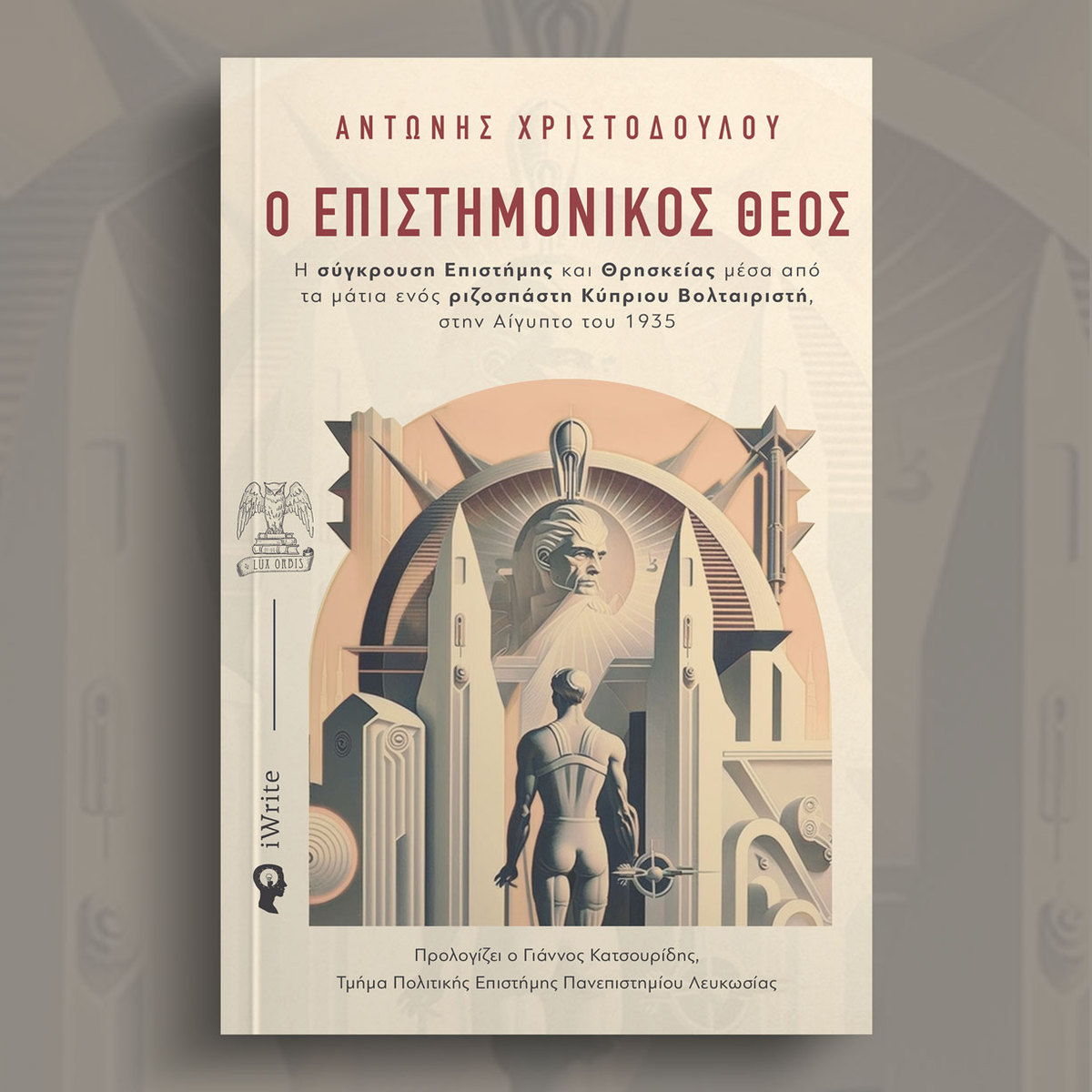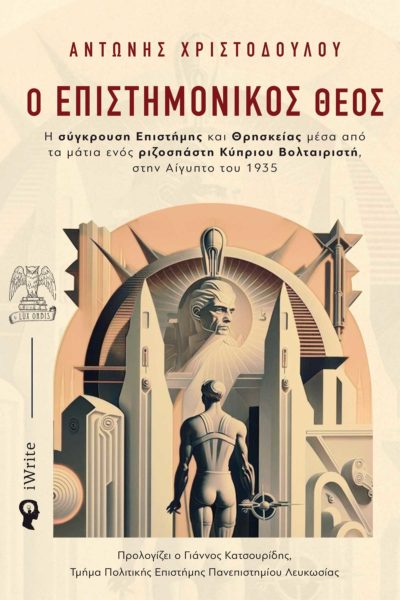Θρησκεία και Επιστήμη συγκρούονται μέσα από το βιβλίο του Κύπριου Αιγυπτιώτη Α. Χριστοδούλου
Γνωριμία με έναν λησμονημένο δοκιμιογράφο
Θρησκεία και Επιστήμη συγκρούονται στο βιβλίο του Αντώνη Χριστοδούλου, το οποίο κυκλοφορεί από τη σειρά Lux Orbis των Εκδόσεων iWrite, ογδόντα οκτώ ολόκληρα χρόνια μετά την παρθενική έκδοση του έργου. Ας δούμε πρώτα λίγα πράγματα για τον δημιουργό του.
Για τη ζωή και τη δράση του Αντώνη Χριστοδούλου οι πηγές που υπάρχουν είναι λιγοστές. Δεν υπάρχουν διαθέσιμες πληροφορίες για τον ακριβή χρόνο και τόπο της γέννησής του, παρ’ όλα αυτά είναι γνωστό πως η καταγωγή του ήταν από την επαρχία της Πάφου στην Κύπρο. Η δραστηριότητά του στην Αίγυπτο ξεκινά στα 1903, ενώ πέθανε τριάντα πέντε χρόνια αργότερα, στα 1938 στο Παρίσι. Οι σπουδές του ήταν στη Χημεία και πιθανότατα στη Γεωπονία, ενώ η ζωή του στην πόλη Μιτ-Γαμρ. Επίσης, ίδρυσε με τον αδερφό του εταιρεία γύρω από το εμπόριο βαμβακιού.
Από το 1903, ο Χριστοδούλου κάνει την εμφάνισή του στο χώρο των ελληνικών γραμμάτων της Αιγύπτου. Σε αυτό το πλαίσιο, ξεκινά την έκδοση της σατιρικής εφημερίδας «Ο Κόπανος», σε συνεργασία με τον Γεώργιο Στρατή. Παράλληλα, συνεργάζεται με το περιοδικό «Παναιγύπτια» και τις εφημερίδες «Κάιρο», «Κάιρο-Κλειώ» και «Ημερολόγιο Πάργα». Συνέγραψε τρία έργα. Ύμνος προς την οκνηρίαν (Αλεξάνδρεια, 1933), Δον Κιχώται επί πηγάσσων (Μιτ-Γαμρ, 1934) και Ο Επιστημονικός Θεός (Μιτ-Γαμρ, 1935). Αξιοσημείωτο, τέλος, είναι το γεγονός πως τελευταία του κατοικία υπήρξε το νεκροταφείο των ελευθερόφρονων/άθεων/άθρησκων εκείνης της εποχής στην κοσμοπολίτικη Αλεξάνδρεια.
Ένα βιβλίο μπροστά από την εποχή του Ο Επιστημονικός Θεός αποτελεί, δίχως αμφιβολία, το πιο ριζοσπαστικό και τολμηρό έργο του Αντώνη Χριστοδούλου. Μία οξεία επίθεση στον διαχρονικό ρόλο του χριστιανισμού και των εκπροσώπων του, ιερέων και θεολόγων. Από τα βέλη του συγγραφέα δεν ξεφεύγει ούτε ο ιουδαϊσμός, από τη στιγμή που ο χριστιανισμός αποτελεί παράγωγό του.
Σχέση με την επιστήμη Αρχαία Ελλάδα και η ρήξη με τη θρησκεία
Ένα σημείο στο οποίο αξίζει να σταθεί κανείς αποτελεί η θέση του Χριστοδούλου απέναντι στον αρχαίο ελληνικό κόσμο. Την κοσμοθέαση που αυτός παρήγαγε, καθώς επίσης και το λυκόφως του κατά την περίοδο της ανάδυσης και επικράτησης του χριστιανισμού.
Τα προηγούμενα αποτελούν ζητήματα που απασχόλησαν έντονα τη σκέψη του Κύπριου συγγραφέα. Γράφει χαρακτηριστικά:
«Οἱ ἀρχαῖοι ἕλληνες μὲ τὴν εὔπεπτον και ἀφανάτιστον καὶ πρακτικὴν καὶ φυσιοκρατικὴν θρησκείαν των εἶχαν προσεγγίσει σχεδὸν τὰ ὅρια τοῦ τελείου. Ὁ Πλάτων καὶ ὁ Ἀριστοτέλης καὶ ὁ Εὐκλείδης καὶ ὁ Πυθαγόρας καὶ ὁ Ἵππαρχος μόνον μὲ τὴν ἐπαφὴν τοιαύτης ἐκλεκτικῆς θρησκείας ἦτο δυνατὸν νὰ παρασκευάσουν τόσας πνευματικὰς ἐκρήξεις. Ἐὰν ὁ ἀνεπιστημονικὸς χριστιανισμὸς δὲν ἀνέκοπτε τὸ ἔργο των, ἡ ἀνθρωπότης σήμερα θὰ ἐγνώριζε τὸν πολλοστὸν Ἐινστέιν καὶ Παστὲρ καὶ Μαρκόνι καὶ Ἔδισον».
Πώς όμως έγινε η μετάβαση από τον αρχαίο κόσμο στον χριστιανισμό; Τι αναφέρει το βιβλίο για τη Θρησκεία και την Επιστήμη;
Ένα ακόμα σημείο στο οποίο είναι ξεκάθαρη η προωθημένη σκέψη του Κύπριου στοχαστή αφορά την άποψή του για την πολιτική και τον δημόσιο λόγο του ορθόδοξου χριστιανικού ιερατείου στην εποχή του. Μια εποχή κατά την οποία η επιστημονική πρόοδος συνέχιζε τον ξέφρενο καλπασμό της. Είχε ήδη συμπληρώσει τουλάχιστον επτά δεκαετίες συνταρακτικών ανακαλύψεων στους τομείς της βιολογίας, της φυσικής και της χημείας. Ανακαλύψεων που κατέρριπταν εμφατικά ποικίλα θεολογικά δόγματα.
Τι είπαν οι τότε κριτικοί για τον Επιστημονικό Θεό
Τον Φεβρουάριο του 1936, το περιοδικό «Παναιγύπτια» δημοσιεύει μία διθυραμβική βιβλιοκριτική του Επιστημονικού Θεού από τον Σωκράτη Λαγουδάκη. Στο κείμενό του, ο Λαγουδάκης μάς πληροφορεί, ανάμεσα στα άλλα, πως η έκδοση του «πειστικού» βιβλίου του Χριστοδούλου προκάλεσε μεγάλη αναστάτωση στην ελληνική κοινότητα της Αιγύπτου.
Για την εξέλιξη και κατάληξη της συγκεκριμένης υπόθεσης δεν γνωρίζουμε περισσότερα. Παρ’ όλα αυτά μπορεί κανείς εύκολα να αντιληφθεί τη σφοδρότητα των θέσεων του Χριστοδούλου που προκάλεσαν μια τέτοιου είδους αντίδραση. Όσο και τη δυνητική ικανότητα της Εκκλησίας να «μπλοκάρει» την κυκλοφορία ενός συγγραφικού έργου στην ελληνική παροικία της Αιγύπτου. Λίγες, πάντως εβδομάδες νωρίτερα (1-15 Ιανουαρίου 1936), o Ντίνος Κουτσούμης χαρακτηρίζει το βιβλίο σε σημείωμά του στα «Παναιγύπτια» ως «το καλύτερο και πιο ωφέλιμο βιβλίο της χρονιάς».
Από τις διαθέσιμες πηγές και την αρθρογραφία που εμφανίζεται στα έντυπα της εποχής στην Αίγυπτο ο Χριστοδούλου δεν ένιωθε μαύρο πρόβατο της ελληνικής ομογένειας. Στην Αίγυπτο και στην Αλεξάνδρεια υπήρχε μία ομάδα Ελλήνων ελευθερόφρονων πολύ προχωρημένη. Ταυτόχρονα είναι γνωστός ο για λόγους αντίστασης προς το ξένο περιβάλλον συντηρητισμός σε θέματα τουλάχιστο θρησκείας και παράδοση. Και αυτό είναι ένα φαινόμενο που χρειάζεται ιδιαίτερη μελέτη και ερμηνεία.
Η πρωτοτυπία και ο συμβολισμός της νέας έκδοσης
Στη Σειρά Lux Orbis των εκδόσεων iWrite, επιλέξαμε να τιμήσουμε συμβολικά το όραμα του Χριστοδούλου για τον μελλοντικό ρόλο της Επιστήμης. Κι αυτό το καταφέραμε μέσω του εξωφύλλου της νέας κυκλοφορίας. Για πρώτη φορά το σχέδιο είναι προϊόν από πρόγραμμα τεχνητής νοημοσύνης. Δόθηκαν μονο οι κατάλληλες κατευθυντήριες για τη δημιουργία μιας καλλιτεχνικής σύνθεσης με φουτουριστικά στοιχεία της δεκαετίας του ’30. Το πλάνο ήταν ένα μέλλον στο οποίο ο θεός της επιστήμης θα έχει επικρατήσει έναντι εκείνων των μονοθεϊστικών θρησκειών.
Ποιος είναι τελικά ο Επιστημονικός Θεός του Αντώνη Χριστοδούλου;
Βρείτε περισσότερα για τη Θρησκεία και Επιστήμη στο βιβλίο «Επιστημονικός Θεός» από τις Εκδόσεις iWrite


